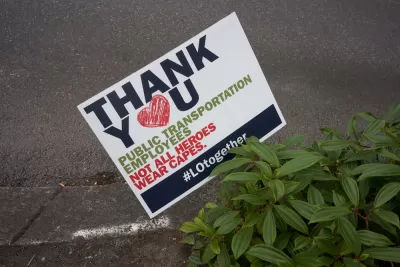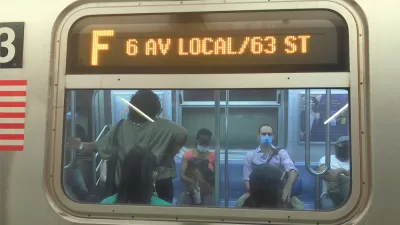Riders who rely most on public transit are suffering the worst consequences of the cuts to service during the fiscal belt tightening of the coronavirus pandemic.

Pranshu Verma reports on the state of public transit service around the country as the fiscal and ridership fallout from the pandemic deepens:
Public transit leaders across the country have issued dire warnings to Congress, saying that the first $25 billion in aid they received in March is quickly drying up, and they need more — otherwise their systems will go into a “death spiral.”
As public transit agencies feel the pain of declining revenues from fare payments as well as the other sources of funding, like sales taxes, for example, it's the most vulnerable users who are suffering the most, according to Verma.
But as service cuts to the United States’ bus, rail and subway systems start to happen, experts say it is the nation’s low-income residents, people of color and essential workers bearing the brunt. Many of them feel the congressional gridlock is completely ignoring their plight.
The article includes anecdotes from New Orleans about the plight of residents who depend on public transit to access essential services like grocery stores and medical care, but residents of cities all over the country are experiencing similar consequences.
Meanwhile, according to Verma, the U.S. Senate seems intent not to pass a stimulus package that would provide further funding to transit agencies around the country. The U.S. House of Representatives approved the HEROES Act in May, although transit advocates have criticized that bill, as well as the predecessor CARES Act, for spending too much on car-centric projects and reinforcing the funding status quo.
FULL STORY: ‘We’re Desperate’: Transit Cuts Felt Deepest in Low-Income Areas

Maui's Vacation Rental Debate Turns Ugly
Verbal attacks, misinformation campaigns and fistfights plague a high-stakes debate to convert thousands of vacation rentals into long-term housing.

Planetizen Federal Action Tracker
A weekly monitor of how Trump’s orders and actions are impacting planners and planning in America.

In Urban Planning, AI Prompting Could be the New Design Thinking
Creativity has long been key to great urban design. What if we see AI as our new creative partner?

Pedestrian Deaths Drop, Remain Twice as High as in 2009
Fatalities declined by 4 percent in 2024, but the U.S. is still nowhere close to ‘Vision Zero.’

King County Supportive Housing Program Offers Hope for Unhoused Residents
The county is taking a ‘Housing First’ approach that prioritizes getting people into housing, then offering wraparound supportive services.

Researchers Use AI to Get Clearer Picture of US Housing
Analysts are using artificial intelligence to supercharge their research by allowing them to comb through data faster. Though these AI tools can be error prone, they save time and housing researchers are optimistic about the future.
Urban Design for Planners 1: Software Tools
This six-course series explores essential urban design concepts using open source software and equips planners with the tools they need to participate fully in the urban design process.
Planning for Universal Design
Learn the tools for implementing Universal Design in planning regulations.
planning NEXT
Appalachian Highlands Housing Partners
Mpact (founded as Rail~Volution)
City of Camden Redevelopment Agency
City of Astoria
City of Portland
City of Laramie




























